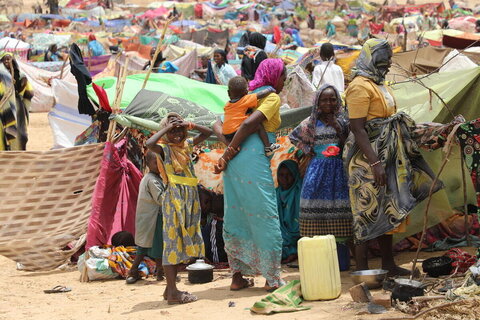
Exclusive: The World Food Program’s problems in Sudan made it harder to help people who are hungry and turned off donors – internal report
According to a recent internal assessment seen by Reuters, the United Nations World Food Program is having significant issues with its response to the Sudan crisis, which is impeding the organization’s capacity to reduce hunger in the war-torn nation and harming its standing with donors.
The WFP, the primary food aid distributor for the United Nations, is having difficulty providing food for millions of people in the African nation, which is facing one of the greatest famine crises in the world. The report lists a number of issues with the WFP’s response in Sudan, such as the organization’s incapacity to expand its activities, lost financial possibilities, and what it refers to as “anti-fraud challenges.”
The WFP’s Regional Emergency Coordination (REC) team, which was entrusted with assisting in the expansion of the U.N. agency’s operations in Sudan and surrounding nations, conducted an assessment in July and August that produced the report. A five-page “REC Diagnostic Report,” dated August 30 and designated confidential, summarizes the team’s conclusions in full. Sudan is referred to as the WFP’s largest emergency in the report.
The report’s release coincides with the World Food Program’s struggles to raise billions of dollars for areas of the world that are experiencing famine and a crisis of trust among major donors, including the United States. Approximately 50% of Sudan’s 50 million inhabitants are thought to be severely hungry as a result of the civil conflict that has raged there since April 2023. Every day, hundreds are thought to perish from malnutrition and diseases linked to hunger.
Regarding its activities in Sudan, the study claims that “WFP’s reputation for rapid emergency response has been damaged.” “Now, before allocating more funds, important stakeholders, including important donors, are demanding tangible progress.”
WFP Deputy Executive Director Carl Skau told Reuters that the WFP and other humanitarian organizations were unprepared for the unexpected catastrophe in Sudan, but he did not elaborate on the report’s specifics when asked about it. In an interview in Cairo on Monday, Skau stated, “It took us too long to actually get back on our feet and deliver in an effective, efficient, and principled way.” “We’re doing everything we can, and I’m sure the WFP is there now.”
According to Skau, the WFP has strengthened teams in regional offices, reassessed its approach to reaching those in need, and appointed the best leadership available for its response in Sudan in recent months. He noted that there are about 700 WFP vehicles operating in Sudan. Additionally, the WFP reported that this year it provided cash-based help to more than 2 million individuals nationwide.
Skau stated, “We always want our colleagues to provide honest assessments.” “And the idea is always that we deal with that after that.”
In-depth inquiries concerning the report’s conclusions were not answered by a WFP representative.
Overly optimistic assistance distribution targets are also criticized in the WFP’s internal assessment. According to the report, the Sudan office’s original goal of helping 8.4 million individuals in need was “deemed unrealistic and posed a reputational risk to the organization.” The report’s conclusion is that “current projections suggest that WFP may only be able to fulfill around 50 percent of its current implementation plan by October 2024.”
An examination of the WFP’s agreements with its food distribution partners revealed “excessively high operational costs irrespective of the quantities distributed,” according to the report. According to the report, payments to non-governmental organizations “achieved less than 5 per cent” of their distribution targets as a result of high expenses and “unrealistic planning.”
Reuters reported in August that the World Food Program is looking into two of its senior officials in Sudan on charges of fraud and lying to funders about the organization’s capacity to provide relief.
According to persons acquainted with the situation, the WFP’s inspector general’s office, which is conducting the investigation, has received the emergency coordination team’s report on Sudan since it addresses issues pertaining to the fraud investigation. According to the persons, contributors have not been given access to the team’s findings.
Regarding the status of the Sudan fraud inquiry, the WFP remained silent. Although it declined to elaborate on the alleged misconduct, it earlier told Reuters that it is looking into “allegations of individual misconduct related to irregularities in pockets of our operation in Sudan.”
Delays in reporting and addressing occurrences that the emergency coordination team referred to as “Anti-Fraud and Anti-Corruption” were among the problems noted in their report. Nearly 200 cases were past due or pending in August, “posing reputational and operational risks,” the study stated. It doesn’t go into detail on the cases.
The two-page “Action Plan,” dated September 23, is attached to the team’s report. Restoring ties with donors and the World Bank, updating aid targets, and creating a task force to clear the backlog of fraud and corruption investigations are some of the actions listed.
The WFP claims to be the biggest humanitarian organization in the world. For its efforts to end hunger and advance peace, it was awarded the Nobel Peace Prize in 2020.
However, in other nations, such as Ethiopia, Somalia, and Yemen, significant amounts of its food aid have been stolen or misdirected in recent years. Reuters reported in October that the World Food Program knew for years that food aid was being stolen in Ethiopia but kept doing nothing about it. Later, a large portion of the responsibility was placed on needy relief recipients by the WFP.
All Categories
Recent Posts
Tags
+13162306000
zoneyetu@yahoo.com



